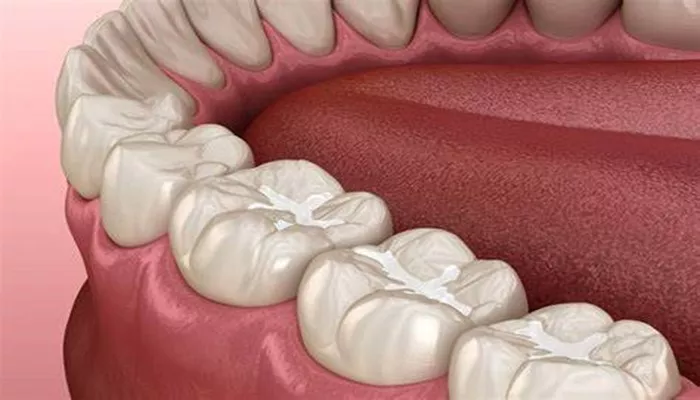dental sealants material
Dental sealants are primarily made of resin-based materials, although newer formulations incorporating other substances are emerging. The two main types are:
1.Composite Resin Sealants: These are the most common and are similar to white fillings. They are tooth-colored and can be made to blend with natural teeth, making them aesthetically pleasing.
2.Glass Ionomer Sealants: These are less commonly used but offer a unique advantage of fluoride release, which can help strengthen the enamel and prevent decay. However, they are less durable compared to composite resins.
Both types are biocompatible, ensuring safety and effectiveness for individuals of all ages.
dental sealants pros and cons
Pros of Dental Sealants:
1.Effective Cavity Prevention: Sealants provide a physical barrier that prevents bacteria and food particles from settling into hard-to-clean grooves.
2.Quick and Painless Application: The process is non-invasive and takes only a few minutes per tooth.
3.Cost-Effective: Preventing cavities with sealants is significantly cheaper than restorative treatments like fillings or crowns.
4.Suitable for All Ages: While commonly used for children and teenagers, sealants can also benefit adults who are prone to cavities.
Cons of Dental Sealants:
1.Durability Issues: Sealants can wear down over time, especially if subjected to heavy chewing or teeth grinding.
2.Not a Substitute for Oral Hygiene: While effective, sealants do not eliminate the need for regular brushing, flossing, and professional cleanings.
3.Possible Allergic Reactions: Though rare, some individuals may have allergic reactions to the materials used in sealants.
4.Limited to Certain Teeth: Sealants are typically applied to molars and premolars, leaving other teeth unprotected.
how long do dental sealants last
Dental sealants can last anywhere from 5 to 10 years, depending on the material used and the individual’s oral habits.
Factors Influencing Longevity:
1.Material Quality: Composite resin sealants tend to last longer than glass ionomer sealants.
2.Oral Hygiene Practices: Regular brushing, flossing, and avoiding excessive consumption of hard or sticky foods can extend the life of sealants.
3.Professional Maintenance: Routine dental checkups allow for the early detection and repair of wear or damage to sealants.
While sealants provide long-term protection, they may need periodic reapplication to ensure continued effectiveness.
dental sealants cost
The cost of dental sealants varies based on factors like location, the type of material used, and whether or not insurance coverage is available.
1.Average Cost per Tooth: The cost typically ranges from $30 to $60 per tooth without insurance.
2.Insurance Coverage: Many dental insurance plans cover sealants for children under a certain age, often up to 14 years old. Some plans may also provide partial coverage for adults.
3.Cost vs. Benefit: Despite the upfront cost, dental sealants are a cost-effective investment as they prevent more expensive treatments like fillings or crowns in the future.
FAQs about Dental Sealants
1.Are Dental Sealants Necessary?
According to the American Dental Association, only about half of children between the ages of 6 and 19 have had sealants placed. These preventative measures are especially important for children whose permanent teeth may or may not have fully erupted yet. When sealants are placed, they protect the chewing surfaces of your child’s back molars from decay, which can lead to cavities. Without them, bacteria can attack these vulnerable areas and cause tooth decay.
2.Will Dental Sealant Placement Hurt My Teeth?
Placing dental sealants is not painful or uncomfortable for the child. In fact, the process is fast, simple, and painless. The dentist will simply clean the tooth to make sure it’s free of plaque and debris and then paint the sealant onto the tooth enamel. The sealant will be clear or white in color, so it won’t be noticeable to others once it’s in place. Placement doesn’t take long at all — usually around one minute per tooth. And the benefits last a lifetime!
3.Do Dental Sealants Protect Teeth From Decay?
Yes, dental sealants do protect against tooth decay because the sealant creates a barrier on the tooth that makes it difficult for bacteria to get inside and cause cavities. Although brushing and flossing are still important parts of your oral health routine, dental sealants make further preventative measures against cavities possible. The plastic-like coating helps to prevent food particles from getting stuck and causing damage inside the mouth. This means you get an extra layer of protection on top of the ones you already have with your at-home hygiene habits.
Dental sealants also protect the surfaces of your back teeth where plaque and food particles tend to collect the most, making it more difficult for you to clean those surfaces thoroughly on your own during regular brushing and flossing. The dental sealant fills in the crevices between teeth and minimizes the amount of food that can get trapped there. This makes it harder for bacteria and plaque to form and lead to decay.
4.Can Food Get Stuck In My Dental Sealant?
No. The dental sealants on our teeth are thin, durable, and made from plastic polymer. This means that food particles are unable to become stuck between your teeth and the dental sealant. In fact, dental sealants are very effective for keeping out plaque and food debris. Dental sealants create a barrier that prevents bacteria from reaching the inner tooth structure. This can help prevent cavities from forming and keep teeth healthy for many years into the future.

